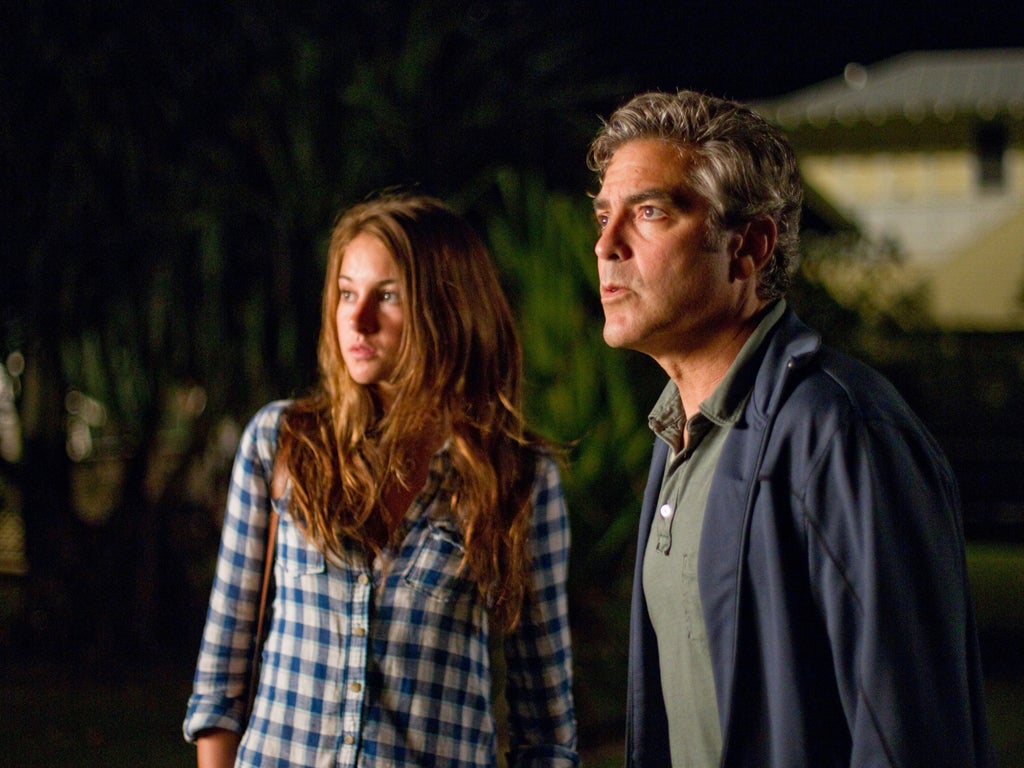The Descendants, Alexander Payne, 115 mins (15)
George is wonderfully ordinary as a Hawaiian everyman with a wife in a coma and a traumatised family to hold together

If Alexander Payne's The Descendants weren't set in Hawaii, it could almost take place somewhere entirely unexotic – New Jersey, perhaps, or Reigate. Although the story is rooted in Hawaiian life, Payne is interested in the ordinariness of things in the USA's 50th state. In voiceover, the protagonist Matt King (George Clooney) complains, "My friends on the mainland think just because I live in Hawaii, I'm in paradise ... Like a permanent vacation ... we're all just out here sipping Mai Tais, shaking our hips and catching waves" – all this over shots of traffic jams, skyscrapers, homeless people. "Are they insane?" he continues. "Do they think we're immune to life?"
Adapted from a novel by Kaui Hart Hemmings, The Descendants isn't immune to life but positively steeped in it. Matt is a well-heeled lawyer facing a pile of worries: his wife Elizabeth (a silent Patricia Hastie) is in a coma following a speedboat accident, and Matt is struggling to look after their mercurial 10-year-old daughter Scottie (Amara Miller, a born joker) and her rebellious, resentful sister Alexandra, 17 (Shailene Woodley). He is also attending to the sale of 25,000 acres of unspoilt land handed down to his family from royal Hawaiian ancestors; this idyllic tract seems fated to become a parody of paradise, developed into golf courses and hotels.
Compared to the sorrow that Matt is facing, the fate of some real estate shouldn't matter much – and Payne and co-writers Nat Faxon and Jim Rash don't entirely make the property theme gel with the rest. But the subplot gives a solid workaday background to the film's emotionally resonant themes: life, love, death, family, fidelity and its opposite.
Payne's previous films have straddled the American mundane and a more heightened comic eccentricity – notably, high-school politics satire Election, and the wine-steeped male crisis odyssey Sideways. But The Descendants is Payne's least obviously comic film: a story about the unavoidable sorrows from which no amount of material luxury, or balmy sunsets, can protect you.
Phedon Papamichael's photography contrives to offset the expected beauty of Hawaii against a certain studied drabness. People live in homes decorated in self-consciously folksy-chic style, following a middle-American idea of Hawaiian spirit – for the film's white Hawaiians are nothing if not middle Americans. These cluttered interiors, with their murals of palms and waves and their garishly "authentic" sculptures of fruit, match the adults' glassily relaxed smiles, and the shorts and tastefully laidback shirts that men wear to business meetings. Payne's Hawaii is one bland suburb of the soul.
But niceness can't contain grief, or the sometimes agonising comedy that attends it. Payne isn't afraid to trip emotional wires, to make you cringe. Visiting the unconscious Elizabeth in hospital, Matt lets rip with a stream of wounded invective. His tirade ends with him telling her that their daughter is about to visit: "Try to be nice, OK," he adds testily, as if forgetting that she's in a coma – and the remark tells you everything about what their marriage had become.
The drama's domestic tenor sails knowingly close to the functional, style-less intimacy of American TV movies; even the lyrical Hawaiian guitar music seems designed to lull us, to anaesthetise the discomfort. But in fact, the film's gentleness serves to heighten its emotional charge.
This very fine-tuned film has a superb, alert cast: Shailene Woodley is startlingly assured, playing bitter against vulnerable as Alexandra, and Nick Krause provides the most crowd-pleasing laughs as her dorkish satellite Sid, his character an astute thumbnail of how the young tend to protect themselves emotionally with a veneer of callousness. Veteran Robert Forster is superb as Matt's unforgiving father-in-law, a man seemingly made of compressed rage and gristle; and Beau Bridges drops in briefly and memorably, weirdly resembling a beach bum Denis Healey.
As for Matt, this is possibly Clooney's most ordinary role yet – and that's a tribute. Any residue of Clooney-esque glamour that may have clung to Matt has faded; he's a tired man who doubts he's up to facing his trials. Much of the pleasure of the film is in watching Clooney's Matt acting as if he's in charge of his life – then suddenly freezing in realisation, as the weight of his situation settles on his shoulders.

Watch Apple TV+ free for 7 days
New subscribers only. £8.99/mo. after free trial. Plan auto-renews until cancelled

Watch Apple TV+ free for 7 days
New subscribers only. £8.99/mo. after free trial. Plan auto-renews until cancelled
Hawaii's geography provides a distinctive dramatic feel, the story shifting from island to island. Disappointingly for the drama, Matt's initially thorny relationship with his daughters provides less grist than it promises; perhaps Payne didn't want to twist the knife too much. But this is a mature and serious film about painful adult (and adolescent and childhood) emotions, and the difficulty of the content is offset by a gentle, relaxed comedy-drama smoothness that's deceptive. The film may seem superficially cosy and middle-brow, but its themes, and its performances, tell you otherwise. Don't be fooled by the balmy guitars: there's steel and acid under the painted palms.
Next Week:
Jonathan Romney contemplates more American pain in Young Adult
Film Choice
Ralph Fiennes and Vanessa Redgrave put Shakespeare on a war footing in a red-blooded Balkan-set update of Coriolanus. Wet, weird and sublime, Jean Vigo's 1934 classic L'Atalante, which finds a place on most greatest film lists, gets a welcome revival.
Subscribe to Independent Premium to bookmark this article
Want to bookmark your favourite articles and stories to read or reference later? Start your Independent Premium subscription today.

Join our commenting forum
Join thought-provoking conversations, follow other Independent readers and see their replies